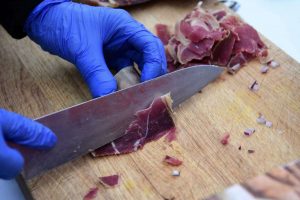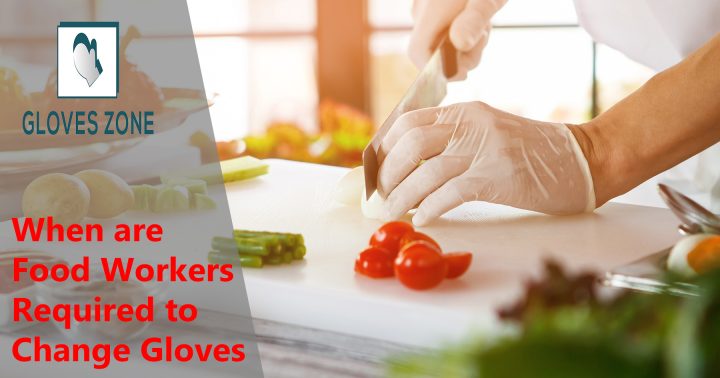Gloves must be changed if they puncture or tear. Gloves have that condition can easily spread bacteria and viruses to other surfaces or foods. For this reason, gloves should always be replaced when they become damaged or soiled.
According to the CDC, gloves must be changed when they become soiled, torn, or when their ability to function as a barrier is compromised. This includes any time you switch between working with raw food and ready-to-eat food.
For example, if a worker is going to handle the cash register after handling raw chicken, they would need to change gloves. Food workers should always practice good hand hygiene by washing their hands before putting on gloves, and between glove changes.
How Often Should Food Workers Change Gloves

Food workers should change gloves maximum of 4 hours or less if they are feeling the gloves become too soiled. If a food worker experiences any skin irritation, they should stop using the gloves. This is because the gloves can easily become contaminated with bacteria and other harmful pathogens if they are not changed often enough. Bacteria can cause food poisoning, so it is important for workers to take precautions to avoid contamination.
When Must I Change Single-Use Gloves
Food workers are supposed to change their gloves at least every 2 hours or whenever they come in contact with a different kind of food.
in general, single-use gloves should be changed when they become damaged or soiled, when they’re no longer providing a barrier against contamination, or when they’ve been in contact with the potentially hazardous material.
Don’t reuse gloves, even if they haven’t been compromised. Food workers who handle different kinds of food in a 2-hour period must change gloves, even if they’re in a back room.
When using gloves, always take care to prevent cross-contamination, and consider using two different gloves if the glove won’t be in contact with raw meat and ready-to-eat food because of the increased risk of cross-contamination
Does Kitchen Staff Have to Wear Gloves
There is no federal law that requires kitchen staff to wear gloves, but many restaurants choose to require gloves as a safety precaution. In California, chefs and bartenders are required to wear gloves when handling food.
Although it is not a requirement by law, it is still highly recommended for the safety of both the kitchen staff and the customers. Kitchen staff can easily spread bacteria from one food to another if their hands are not properly cleaned and sanitized.
secondly, wearing gloves keeps your hands clean and protects them from harsh chemicals and hot oil. Finally, it also prevents the spread of any viruses or illnesses that might be present in the kitchen.
Do I have to Wear Gloves When Handling Food in the UK?

There is no law stating that you have to wear gloves when handling food in the UK. However, it is considered good practice to do so, as it can help to prevent the spread of bacteria and other contaminants.
There are no specific regulations in place in the UK governing glove usage for food handlers, but many supermarkets and restaurants will have their own policies on this matter.
It is usually recommended that gloves be worn when handling raw meat, fish, or poultry, as well as when cleaning dirty dishes or preparing food that will not be cooked further.
When Should a Food Handlers Apron be Removed?
Food handlers should remove their apron when they are finished with their shift. In some cases, they may also be required to remove it when they leave the food preparation area.
By removing your apron, you’re also taking another step towards ensuring a safe and sanitary kitchen environment. A food handler should take off their apron in a designated area and place it in a hygienic manner. Aprons can be laundered as needed to maintain cleanliness.
Is it OK to Handle Food With Bare Hands?
There are laws to prohibit the handling of food with bare hands in many places because it can spread bacteria and cause illness. However, there are exceptions for certain foods that are considered low risk.
Cooking meats and poultry, for example, is a high-risk activity because of the potential for cross-contamination. Bacteria on raw meat can be transferred to other surfaces (and other foods) through contact, which can lead to food poisoning.
However, fruits and vegetables are generally considered low risk because they’re not as likely to contain harmful bacteria. That said, it’s always best to be safe rather than sorry. It’s always a good idea to wash your hands thoroughly with soap and water before handling any food – whether
What must a Food Handler with a Hand-Wound do to Safely Work with Food?
After an injury, a food handler should assess the severity of the injury and whether or not it is likely to cause contamination.
If the injury is serious or looks like it will cause contamination, then the food handler shouldn’t work with food until it has healed.
A food handler with a light hand-wound must do the following to safely work with food:
- Wash the wound and dry it off completely with a clean cloth or paper towel.
- Apply an antiseptic such as hydrogen peroxide, alcohol, iodine, or Betadine to the wound.
- Do not touch your wound while you are washing your hands.
- Cover the wound with a waterproof bandage.
- Wear single-use gloves or change them regularly.
Throw away the bandage, along with the gloves and any contaminated towels, in a designated trash can.

I am not a good blogger but I started blogging when I was in my college. one day scrolling my social media pages and top of the page one notification was coming like this “ earn money from blogging”.then I clicked that notification. After that, I was confused that which niche is better for me. Finally, I selected the niche and I was comfortable with that glove’s reviewer.

